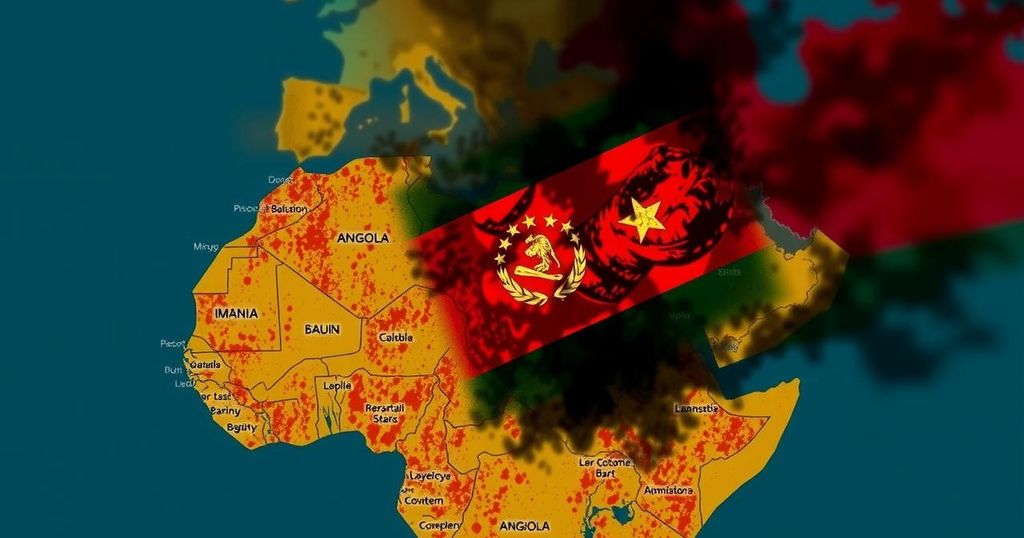Renewed Violence in Eastern DRC Provokes Concern from Angola

The Angolan government expressed concern over renewed violence in eastern DRC, which undermines efforts for a long-term ceasefire. The clashes occurred between self-defense groups and M23 rebels, escalating tensions at a time when both the DRC and Rwanda had committed to peace talks. The humanitarian situation in the region remains dire, with millions displaced due to ongoing conflict.
Renewed hostilities have erupted in eastern Democratic Republic of Congo (DRC), prompting significant concern from the Angolan government, particularly as Luanda was advocating for a long-term ceasefire following a month-long lull in violence. In a statement issued on Tuesday, Angolan officials regarded the resurgence of violence as a blatant infraction of the agreements established during the ministerial assembly held on July 30, 2023, and the subsequent ceasefire that began at midnight on August 4. Angola has been actively mediating between the DRC and Rwanda, two nations that accuse each other of harboring rebel factions seeking to undermine their respective governments. During their last meeting in Luanda two weeks ago, both parties reaffirmed their intent to pursue a peaceful resolution. Kinshasa has committed to ensuring that the FDLR rebels, whom Kigali considers adversaries, do not receive assistance from the Congolese army (Fardc), contingent upon Rwanda’s withdrawal of support for the M23 rebels. Angola has denounced the recent violence, labeling it a “hostile act” that jeopardizes ongoing efforts for a durable solution to the eastern DRC conflict, calling on all parties involved to adhere to the established ceasefire as reiterated during the ministerial meeting of September 14. Reports of violent clashes surfaced over the past weekend in the vicinity of the village of Kalembe. Local eyewitness accounts detailed confrontations between the Wazalendo self-defense group, which aligns with the Congolese army, and the M23 rebels. Subsequent reports indicated that the Congolese army had regained control of the town. Juvenal Munubo, a former member of parliament from Walikale, noted, “I have learnt that the NDC Rénové, with logistical support from the Fardc, has regained control of the town of Kalembe. I call on the Fardc and the patriotic resistance fighters to consolidate this victory.” Further comments by MP Willy Mishiki highlighted concerns that the rebels are aiming to seize control of additional provinces, including South Kivu, Tshopo, and Maniema. Despite these developments, officials in Kinshasa have remained silent regarding the breakdown of the truce, raising questions about the future of the ceasefire agreed upon in Luanda. Since its initiation in early August, the ceasefire had led to some displaced populations tentatively returning to their homes as conditions appeared more favorable than the overcrowded camps in which they had sought refuge. While the DRC government has dismissed prospects for dialogue with the M23 faction, negotiations have persisted between the DRC and Rwanda. The two nations, during their fifth meeting on October 12, agreed to maintain a discourse on unresolved security matters tied to a proposed draft peace agreement. Angola has urged all stakeholders to refrain from actions that may escalate the conflict in the already dire humanitarian landscape. In response to the fighting, 14 civilians were reported injured, with many more fleeing their residences. The Office of the United Nations High Commissioner for Human Rights has projected that 940,000 individuals will be displaced in 2024, culminating in a total of nearly seven million displaced persons in the DRC due to the ongoing conflict. Consequently, civilians in North Kivu face severe overcrowding, aggravated humanitarian conditions, and a range of human rights violations, including instances of sexual violence.
The ongoing conflict in eastern Democratic Republic of Congo has deep historical roots, primarily linked to the volatility created by previous wars and the activity of various armed groups. With the DRC wealthy in natural resources, control over these has often motivated internal and external conflicts. Angolan mediation efforts aim to stabilize not just the DRC, but also the broader region, as the interplay between armed groups and neighboring countries like Rwanda complicates the peace process. The recent ceasefire initiatives are crucial for humanitarian relief and to avoid further exacerbating the crisis that has displaced millions.
The resurgence of violence in eastern DRC poses significant challenges to ongoing peace efforts headed by the Angolan government and reflects the fragile nature of the ceasefire established earlier this year. The commitment of both the DRC and Rwanda to finding common ground remains essential in addressing the humanitarian crisis and establishing lasting peace in the region. Continued vigilance and diplomatic engagement are imperative to prevent a further deterioration of the situation.
Original Source: www.theeastafrican.co.ke








